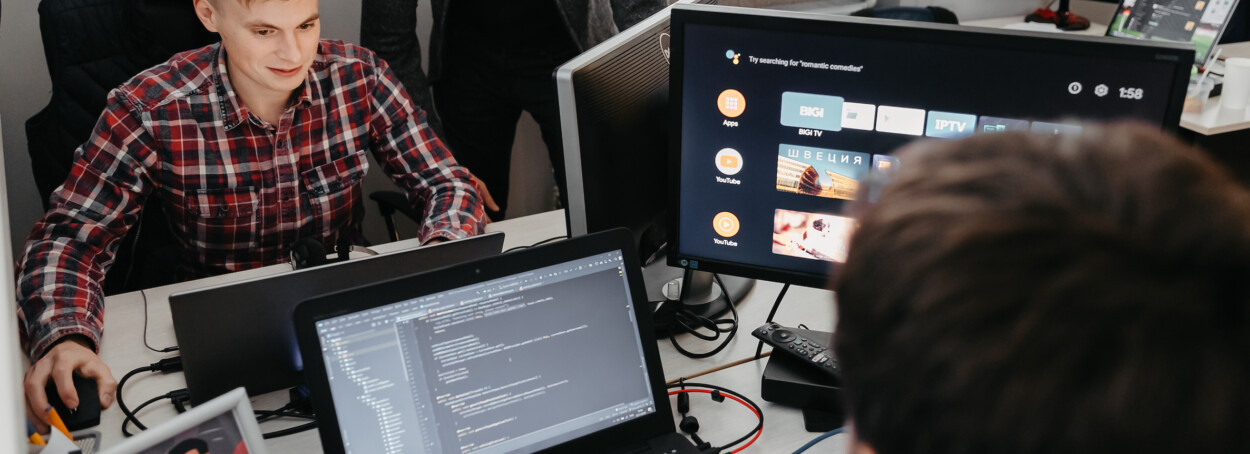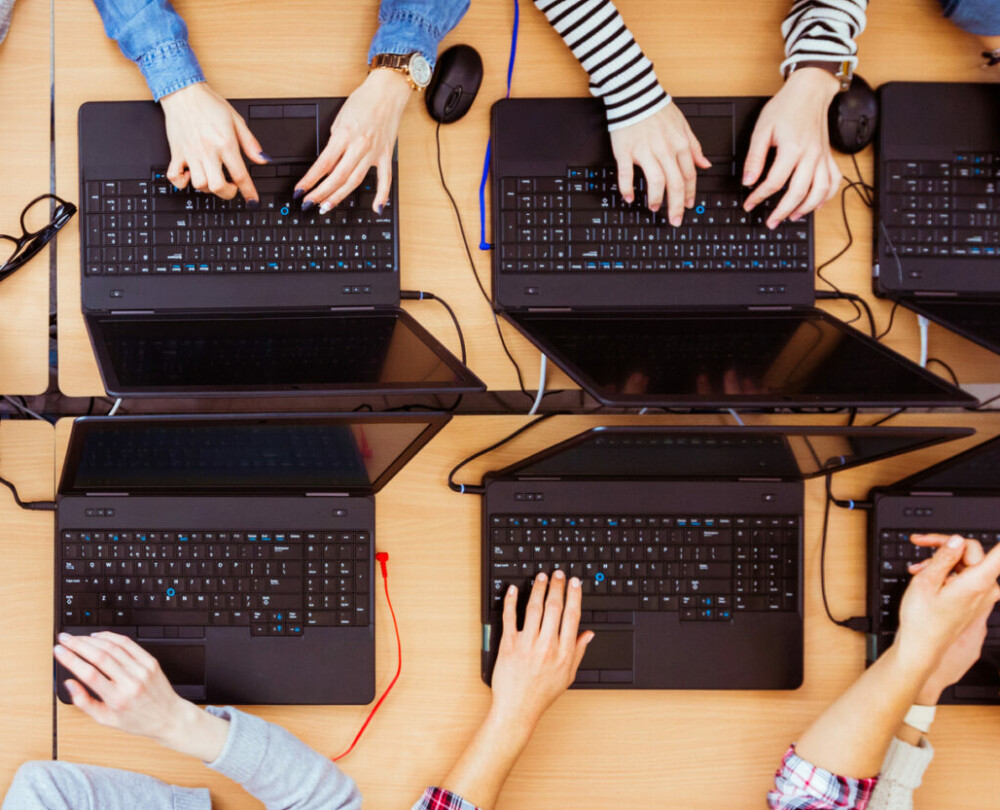

On 5 October, EU4Digital ICT Innovation hosted a virtual study visit to Lithuania and Spain where participants from the Eastern partner countries met EU start-up ecosystem builders. The event discussed the importance of coordinating the organisation for ecosystem development.
The event attracted around 70 participants and 40 various organisations from the Eastern partner countries. The discussion was held together with ministerial level representatives and agencies coordinating the development of innovation ecosystems, as well as other players such as innovation, financial support and consultancy organisations empowering start-up ecosystems in the Eastern partner countries.
The event was opened by a greeting from the EU4Digital Facility Deputy Team Leader Mrs. Rūta Šalvytė-Tamošiūnienė, who introduced the EU4Digital programme and the aims of the networking event. It was followed by the keynote speech about the ‘Importance, role and establishment of the start-up ecosystem builder in the Eastern partner countries’ by EU4Digital Facility ICT Innovation Stream Senior Expert Mr. Jesus Lozano. He compared the efficiency of the EaP region in terms of start-ups’ growth via sales, profits and markets that are still in the development stage and require special efforts to fuel EaP startup ecosystems. The speaker introduced the significant role of start-up ecosystem builders in creating, empowering and boosting ecosystems as well as the main principles of their work. In a summary note, Mr. Lozano suggested ways to empower such ecosystem coordinating organisations, which can come both from the public or private sector, through “declaration of trust and mandate for decision power from the government as well as the possibility to access and analyse information on the ecosystem that would lead to the best strategic decisions in the start-up ecosystem development”.
The study visit then started with virtual visit to Lithuania moderated by Mrs. Rūta Šalvytė-Tamošiūnienė EU4Digital Facility Deputy Team Leader. This session introduced participants to the holistic overview of creating and developing a start-up ecosystem with an emphasis on leading FinTech start-ups’ market development. The session was started by Mr. Ričardas Valančiauskas, Director of Innovation and Industry Department of the Ministry of Economy and Innovation of the Republic of Lithuania. During the presentation on ‘Support for innovation and start-ups in Lithuania’, Mr. Valančiauskas introduced the main instruments for startup ecosystem development, among which are agencies implementing innovation policies, special services and funding tools. Mr. Valančiauskas underlined the specific role of the Lithuanian Innovation Centre and the Agency for Science, Innovation and Technology, which supports both the government and businesses by advising on available tax incentives, establishment of technology companies, creation and development of clusters, among other services. Also, the model of operation of the future Innovation Agency was presented as Lithuania identified a need for a dedicated organisation for innovations developed in the ecosystem. Participants were also interested in ecosystem performance measurement which is focused on quality and evolution rather than on the quantity of start-ups, thus, the following KPIs have been used: start-ups‘ contribution to GDP, export, number of employees and similar.
Then, participants heard more about ‘Growing and facilitating the Lithuanian start-up ecosystem‘ that was presented by Ms. Roberta Rudokienė, Head of Startup Lithuania. Mrs. Rudokienė outlined the main principles of Startup Lithuania‘s coordinating role that is to enable and facilitate the ecosystem players as well as overlook and evaluate the performance of the ecosystem. During the discussion, participants were introduced to specific tools of Startup Lithuania such as the co-creator grant, pre-acceleration course and organising cross-sectoral hackathons.
The start-up ecosystem facilitation topic was followed by a practical deep dive into FinTech start-ups’ development and regulator’s support in Lithuania that was introduced by Ms. Rūta Merkevičiūtė, Director of Financial Services and Markets Supervision Department at Bank of Lithuania. In her presentation ‘Fintech and Innovation Policy in Lithuania: balancing opportunities and risk mitigation’, Ms. Markevičiūtė made an overview into the toolkit for FinTech start-ups, including the regulatory sandbox for consulting of new market players on regulatory matters and assessing the feasibility of their business models, facilitating the issuance of licences to fintech service providers, as well as innovative approaches to FinTech startups supervision. Following questions from participants, Ms. Merkevičiūtė explained the fintechs’ definition and approach to licensing used by the Bank of Lithuania as well as risk management of fintech solutions by governmental agencies.
For the second session, moderated by EU4Digital Facility ICT Innovation Stream Senior Expert Mr. Jesus Lozano, participants were invited to meet with the ecosystem builders from Spain who shared lessons learnt on developing different areas of the ecosystem such as access to education, finance and resources (facilities). The journey was started by Mr. Dr. Álvaro Simón de Blas, President of National Association of European Business and Innovation Centres (ANCES), presenting development of innovation facilities for start-ups in Spain ‘Spanish National BIC’s Association’. Mr. Simon explained how ANCES, in collaboration with the European Business Angel Network (EBN) as well as private and public sector organisations in Spain, managed to facilitate the establishment and build the capacity of more than 30 business innovation centres. Mr. Simón also introduced financing and open innovation instruments, internal training academy and trademark certification of technology-based companies. In the end, ANCES confirmed the readiness for cooperation with the EaP governments on capacity building of business innovation centres.
After, Mr. Jordi García, Chief Operations and Strategy Officer at National Innovation Enterprise (ENISA), talked about ‘Entrepreneurship and Innovation Ecosystems’ and its development through financing. Mr. García introduced the role of ENISA being one of the main providers of bankable projects within the diverse financing programmes which target entrepreneurs and SMEs, including special instruments for digital women entrepreneurs and digitalisation of agri-food SMEs. Furthermore, ENISA is contributing to the Start-up related laws and Start-up Nations Strategy development by possessing rich practical insights on SMEs financial needs. Thus, ENISA invited to use the framework of ICEX or NESTA Innovative Growth Labs in the EaP countries as well as potentially launch co-investment programmes.
The visit to Spain was concluded with the topic of start-up access to education and R&D opportunities. Mr. Dr. Juan Manuel Corchado Rodríguez, Director of Research Group on Bioinformatics, Intelligent Computer Systems and Educational Technology (BISITE) at the University of Salamanca, presented about ‘Building a Research Environment for Innovation and Entepreneurship’. Mr. Corchado Rodríguez explained how based on BISITE, in partnership with around 40 industrial partners, the IoT Digital Innovation Hub evolves and contributes to the open innovation ecosystem in the Salamanca region. Also, BISITE Accelerator is supporting the technology transfer and private spin-offs creation, which helps the University of Salamanca to ensure the sustainability of activities.
The last part of the session was dedicated to networking and discussion among the participants on which of the best practices and acquired knowledge could be used to foster the development of start-up ecosystems in the Eastern partner countries. For a summary note, the most important for start-up ecosystem development is to have a coordinated approach on providing access to finance, resources, market and knowledge for the ecosystem players. The focus should be on all phases of the start-up lifecycle in order to build the capacity and ensure positive conversion rates of start-ups.
Presentations
- Armenia
- Azerbaijan
- Belarus
- Georgia
- Republic of Moldova
- Ukraine
- ICT innovation
More News

25/04/2024
Azerbaijan’s Digital Code to accelerate digital transformation
A major milestone has been reached in Azerbaijan’s journey toward digitalisation with the development of the ‘…
Read More
25/04/2024
Online marriage via Ukraine’s ‘Diia’ state app approved
The Ukrainian government has approved a resolution enabling citizens to marry via the ‘Diia’ state app as part…
Read More
24/04/2024
European Union strengthens Ukraine’s cyber resilience
By means of the European Peace Facility (EPF), the European Union is bolstering the cybersecurity capabilities…
Read More

25/04/2024
Azerbaijan’s Digital Code to accelerate digital transformation
A major milestone has been reached in Azerbaijan’s journey toward digitalisation with the development of the ‘…
Read More
25/04/2024
Online marriage via Ukraine’s ‘Diia’ state app approved
The Ukrainian government has approved a resolution enabling citizens to marry via the ‘Diia’ state app as part…
Read More
24/04/2024
European Union strengthens Ukraine’s cyber resilience
By means of the European Peace Facility (EPF), the European Union is bolstering the cybersecurity capabilities…
Read More


